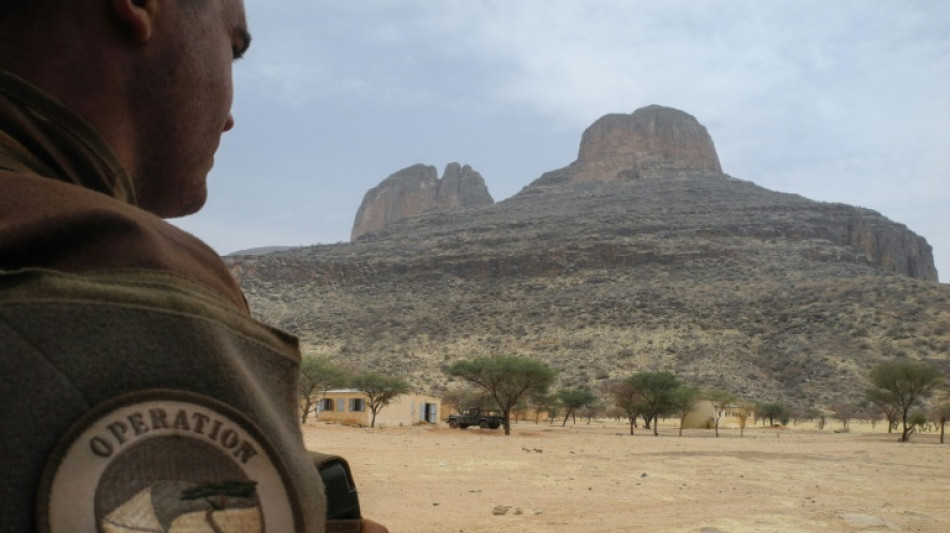

Macron expected to announce Mali withdrawal
French President Emmanuel Macron this week will announce that French troops will be withdrawn from Mali and redeployed elsewhere in the Sahel following a breakdown in ties with the country's military regime, concurring sources say.
Several security sources, speaking on condition of anonymity, told AFP that Macron's announcement to end the nine-year French mission in Mali will coincide with a European Union-African Union summit in Brussels on Thursday and Friday.
France initially deployed troops in 2013 to beat back advancing jihadist fighters in northern Mali.
But the extremists regrouped and in 2015 moved into central Mali, an ethnic powder-keg, before launching cross-border attacks on neighbouring Niger and Burkina Faso.
Now, sporadic raids on countries to the south have raised fears of a jihadist push to the Gulf of Guinea.
The expected pullout amounts to a major strategic shift by France, spurred by a breakdown in its relations with Mali, a former colony and traditional ally, after two military coups.
The withdrawal will end a mission that successive French presidents had argued was crucial for regional and European security.
"If the conditions are no longer in place for us to be able to act in Mali -- which is clearly the case -- we will continue to fight terrorism side-by-side with Sahel countries who want it," French Foreign Minister Jean-Yves Le Drian said Monday.
Macron, who was already planning to reduce the almost 5,000 troops deployed in the Sahel region, is expected to announce redeployments to other bases operated by French forces in neighbouring countries such as Niger.
He is due to host allied African leaders for informal talks in Paris Wednesday ahead of the summit, diplomatic sources said.
With a presidential election looming in April, Macron is eager to avoid comparisons with the US' chaotic withdrawal from Afghanistan last year -- or any suggestion that the deaths of 48 French soldiers have been in vain.
- European fight -
After two coups in Mali since 2020, France and other Western nations complain that the junta has missed deadlines to restore civilian rule and become increasingly hostile to the presence of French and European soldiers on its soil.
This has coincided with the regime developing close ties with Russia, including turning to suspected mercenaries from Russia's private military contractor Wagner.
Last year, Macron announced a reduction of France's Barkhane force amid questions over both the financial cost of the nearly decade-long mission and its rising human toll, prompting a furious reaction from Mali.
In recent years, fellow EU nations had joined France in the Sahel, sharing the military and financial burden and -- Paris hoped -- limiting long-standing allegations of French interference in its former African colonies.
But the bell is tolling for this mission.
Denmark announced it was withdrawing its contingent of elite soldiers in late January and Norway has abandoned a planned deployment.
"It's impossible to continue in such conditions," Estonian Defence Minister Kalle Laanet told the Postimees daily on Saturday.
Sources familiar with negotiations said there had been disagreement among Europeans as well as with the British and Americans about a wider departure, including over the risks of leaving Mali open to Russian influence.
But France believes it has smoothed these concerns.
France is promising to coordinate its move with the UN's MINUSMA peacekeeping force and to continue to support an EU training mission for the Malian army, providing them with air power and medical support for the time being, a source close to the French presidency said.
"The real game changer is that the Malian army will lose our air support from one day to the next, that poses a risk of a security gap," the source added.
- 'In the neighbourhood' -
Even if European forces quit Mali, "there will always be some kind of cooperation" between EU and Sahel states, said Ornella Moderan of the Institute for Security Studies.
"The Europeans can't do without the Sahel, it's in their neighbourhood."
Just this weekend, France said its troops had killed 40 jihadists in Burkina Faso, including individuals believed to be behind three improvised bomb attacks in northern Benin that killed nine people including one French national.
European governments fear that shifting relationships with the region's rulers risk leaving a vacuum for movements tied to Al-Qaeda and the Islamic State group.
As well as Mali, Burkina Faso and Guinea Bissau have been hit by recent military coups.
In Mali, the government failed to commit resources to re-impose its authority on areas that had been cleared of jihadists by French troops, and the armed forces remain weak despite years of effort to train them up.
"It will be important to learn the lessons from the Sahel" if the action expands to Gulf of Guinea countries, said Bakary Sambe of the Timbuktu Institute thinktank.
F.Gionfriddo--LDdC



